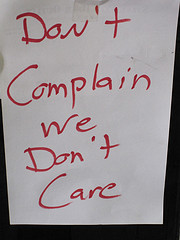Can You Get Away With Complaining About Your Job Online? Maybe, Says NLRB
The New York Times takes a look at a number of recent rulings from the National Labor Relations Board, in which the organization was asked to decide whether employers had wrongfully dismissed workers because of their online complaints.
Writes the Times’ Steven Greenhouse:
The labor board’s rulings, which apply to virtually all private sector employers, generally tell companies that it is illegal to adopt broad social media policies — like bans on “disrespectful” comments or posts that criticize the employer — if those policies discourage workers from exercising their right to communicate with one another with the aim of improving wages, benefits or working conditions.
So, by the NLRB’s standards, it’s okay for co-workers to go on Facebook and discuss work-related issues that are ticking them off. In that way, it’s no difference than the hushed conversations around the coffee machine that have taken place since the first coffee machine was ever put into an office.
“Many view social media as the new water cooler,” explains NLRB chair Mark G. Pearce. “All we’re doing is applying traditional rules to a new technology.”
But your employer still certainly has the right to hand you a pink slip for some things you post online.
There’s the Arizona newspaper reporter who was fired for Tweeting things like, “No overnight homicide… You’re slacking, Tucson,” and the Illinois bartender dismissed after he vented on Facebook that he hoped his “redneck” customers choked on glass while driving home.
In both cases, the NLRB found that the online posts had nothing to do with conversing about working conditions or wages.
“An employee’s comments on social media are generally not protected if they are mere gripes not made in relation to group activity among employees,” reads a statement from the NLRB.
Some contend that, even with these recent NLRB rulings, it is still a bit nebulous as to what you can safely say online without risking your job.
“Even when you review the NLRB rules and think you’re following the mandates,” one labor lawyer tells the Times, “there’s still a good deal of uncertainty.”
Want more consumer news? Visit our parent organization, Consumer Reports, for the latest on scams, recalls, and other consumer issues.


